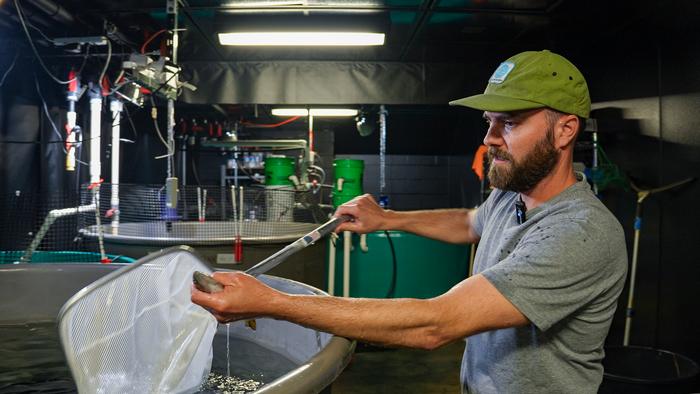DULUTH, Minn.—The aquaculture industry in the Great Lakes region faces an intricate tapestry of regulations and legislative hurdles that can inhibit growth and innovation among fish farmers. In response to this challenge, a new publication titled "Aquaculture Regulations in the Great Lakes" has been introduced, serving as a vital guide for aquaculture practitioners. Developed by the National Sea Grant Law Center in collaboration with the Minnesota Sea Grant-led Great Lakes Aquaculture Collaborative, this resource aims to demystify the complex legal frameworks that govern aquaculture across multiple states.
The publication delves into the specific legal frameworks and regulatory requirements necessary for aquaculture producers to thrive in an environment often defined by bureaucratic ambiguity. It encapsulates the myriad of licenses, permits, and compliance measures that vary widely across the eight Great Lakes states. By offering clarity on these regulations, the document empowers fish farmers to make informed decisions, ultimately fostering a sustainable aquaculture industry in a region rich in aquatic resources.
Understanding the prevailing regulatory landscape is critically important for stakeholders in the Great Lakes aquaculture sector. Amy Schrank, the Fisheries and Aquaculture Extension Educator with Minnesota Sea Grant, underscores the significance of this resource, saying, “This publication serves as a valuable resource for fish farmers and policymakers to navigate a complex legal environment and identify opportunities for harmonization and improvement.” Such sentiments echo the broader imperative of integrating regulatory understanding into the operational strategies of aquaculture businesses.
The report provides a thorough examination of each state’s aquaculture laws, encompassing everything from general licensing requirements to specific health guidelines that pertain to the aquaculture industry. It outlines approved and prohibited species, watershed management practices, and compliance with pertinent environmental laws, which are all essential for ensuring responsible fish farming practices in the Great Lakes.
In addition to the established regulations, the report also tackles crucial environmental considerations that can impact aquaculture operations. These include water withdrawal statutes and pollutant discharge regulations, which are vital for sustaining both aquaculture practices and the surrounding ecosystems. By shedding light on these intertwined factors, the publication highlights the significance of adopting environmentally friendly and sustainable practices in aquaculture production.
The collaborative effort involved a comprehensive review of state and regional laws, focusing on identifying commonalities and differences that contribute to a fragmented regulatory environment. This rigorous analysis not only elucidates the current legal landscape but also points toward existing gaps and inconsistencies that could hinder growth and pose challenges for aquaculture farming. The report’s findings are anticipated to enhance the regulatory framework, facilitating better-informed decision-making for farmers, policymakers, and regulators alike.
Beyond individual compliance, the report aims to catalyze broader discussions about harmonizing regulations across the Great Lakes, encouraging state collaboration to create a more cohesive aquaculture regulatory framework that benefits the entire region. This could potentially lead to a more streamlined approach to aquaculture regulation that not only simplifies compliance for producers but also enhances the overall sustainability of the industry.
The insights and recommendations outlined in this publication can serve as instrumental tools for aquaculture stakeholders who wish to deepen their understanding of the regulatory nuances affecting their operations. Comprehensive guidance is essential to foster best practices that not only support the industry’s growth but also prioritize ecological stewardship as a foundational principle of aquaculture in the region.
Moreover, the collaborative nature of this publication represents a commitment by the National Sea Grant Law Center and the Minnesota Sea Grant to support fish farmers amid an evolving regulatory landscape. By encouraging continuous dialogue and providing diverse resources, they seek to empower fish farmers to navigate challenges effectively and pursue opportunities for growth.
The report’s availability through the Sea Grant Great Lakes Aquaculture Collaborative resources webpage offers a pivotal opportunity for stakeholders to access up-to-date information. This accessibility is crucial, providing fish farmers and regulators with the necessary tools to adapt and thrive in an ever-changing environment marked by regulatory complexities.
In closing, the publication "Aquaculture Regulations in the Great Lakes" emerges as a timely and essential resource for navigating the intricate regulatory landscape that defines the aquaculture industry in this pivotal region. It acts not merely as a guide, but as a call to action for all stakeholders involved in this vital sector, advocating for a more sustainable and well-regulated aquaculture landscape that harmonizes economic growth with environmental responsibility.
Subject of Research: Aquaculture regulatory frameworks in the Great Lakes region
Article Title: Navigating the Complex Regulatory Terrain of Aquaculture in the Great Lakes
News Publication Date: October 2023
Web References: Aquaculture Regulations in the Great Lakes
References: National Sea Grant Law Center, Minnesota Sea Grant, Great Lakes Aquaculture Collaborative
Image Credits: Minnesota Sea Grant
Keywords: Aquaculture, Sustainable agriculture, Food production, Regulatory compliance, Great Lakes, Environmental stewardship.




